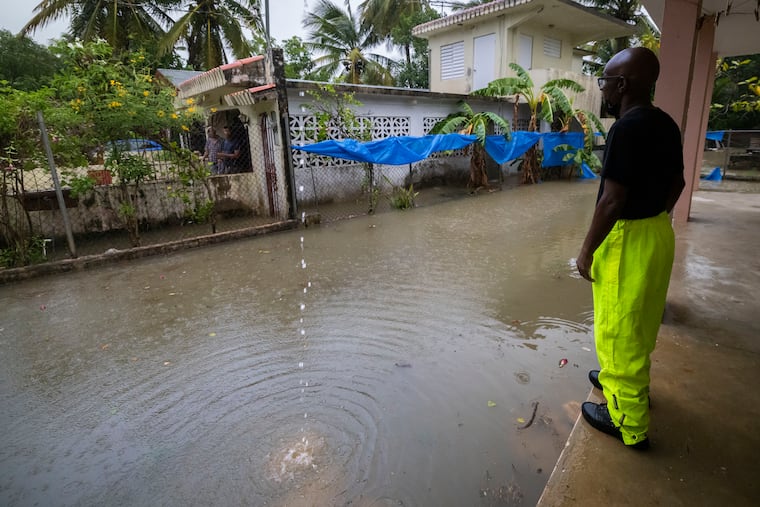Local Puerto Rican and Dominican communities are readying humanitarian response to hurricane — again
“Puerto Rico is resilient, we will get back up,” said the Rev. Jessie Alejandro, who helped organize Philly’s response to Hurricane Maria five years ago.

Philadelphia’s Puerto Rican and Dominican communities are organizing to support their islands’ recovery from Hurricane Fiona, a category 1 storm that hit on Sunday that has left both locations reeling from major flooding and mudslides.
“After Mass, I was just feeling sad. It took folks five years trying to rebuild — to build their houses and their businesses. I’m sure people are feeling that it isn’t fair. It hurts my soul. It took such a long time trying to heal,” said the Rev. Jessie Alejandro, a Puerto Rican community activist in Philadelphia who helped organize the local response to Hurricane Maria.
» READ MORE: Hurricane Fiona slams Dominican Republic after pounding Puerto Rico
She has just started to reach out to the contacts she made in Puerto Rico, especially to the mayors of smaller towns, to assess damage. “How do we come back and help Puerto Rico again?” she asked.
State Rep. Danilo Burgos, who said the northeast part of the Dominican Republic was hard hit, is also working with the city’s Dominican community to assess the damage and to determine the help that is needed. “We did it when Hurricane George hit the Dominican Republic and Puerto Rico and we will do it once again,” he said. Hurricane George was a category 4 storm that hit in 1998.
“The last 24 hours have been traumatic as we watched the devastation in Puerto Rico caused by Hurricane Fiona while the horrors of Hurricane Maria is so present in our minds,” said Nilda Ruiz, president and CEO of Asociación Puertorriqueños en Marcha (APM). “The good news is that communication is not lost, and that the whole island did not get hit as hard.”
Members of the Puerto Rican community have just started meeting to determine a course of action to support victims of Fiona, including working with Indigenous community-based organizations.
“We know the devastating effects Hurricane Maria brought upon the lives of those who were in the island at the time,” Ruiz said, adding that APM was able to provide direct relief to 250 families and assisted over 2,000 people in the Philadelphia area.
“We are communicating by (WhatsApp) and by text. In every case, no one has power and some don’t have water.”
“We are hopeful to do the same during Hurricane Fiona if needed, and will do our very best to hold legislature accountable during this collective effort.” she said.
About 146,000 Puerto Ricans live in Philadelphia and almost all have family still on the island.
“I have family in San Juan and in the southern part of the island, in Ponce, which was impacted harder,” said Julia Rivera, chief external affairs officer for Congreso de Latinos Unidos. “We are communicating by (WhatsApp) and by text. In every case, no one has power and some don’t have water. The threat going on now is [more about] flooding.”
Puerto Rico’s Governor, Pedro Pierluisi, who was elected in 2020 and is managing his first major hurricane, called the damages “catastrophic” but no hurricane-related deaths have been reported. President Joe Biden supported Puerto Rico’s call for a state of emergency, allowing the Federal Emergency Management Agency (FEMA) to assist local officials to coordinate all disaster relief efforts.
Izzy Colón, whose mother still lives on the island, saved many of his complaints for LUMA, the island’s energy supplier and the electric grid that regularly fails. According to LUMA, of its 1.5 million customers, 1.3 million are currently without power. “Those grids were never good but people got used to them.”
Colón predicts that Fiona will activate local community organizations to continue to fight for better “people infrastructure” on the island.
Carmen Febo, a physician and the former executive director of Taller Puertorriqueño, who helped organize a response to Hurricane Maria, said that nothing formal has been created yet for Fiona.
“I’m just looking at the images now, but it breaks my heart. Here we go again.”
“I’m just looking at the images now, but it breaks my heart. Here we go again,” she said.
Febo said if the climate-related problems were limited to Puerto Rico it would be a sign of “bad luck.”
“But it is happening in America, in Pakistan, in Africa, all over Europe, and in Alaska. You have to start thinking that all these events are about something much, much more,” she said.
Alejandro, remembering the needs from Maria, said the electricity will be a problem, but there will be an ongoing need for money to rebuild, especially in the center of the island where the towns are smaller and more rural. Poignantly, Fiona hit Puerto Rico on the 33rd anniversary of Hurricane Hugo, a category 3 storm, and two days before the 5th anniversary of Hurricane Maria.
“Puerto Rico is resilient, we will get back up,” Alejandro said.